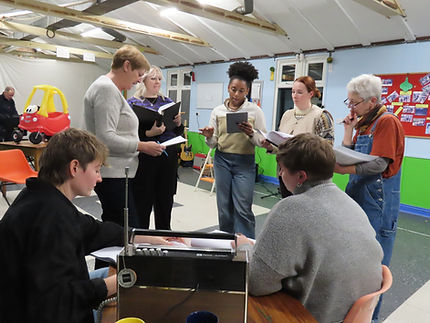

NEWS: GWENDA'S GARAGE RIDES AGAIN!
After the huge success of our script-in-hand performances, we're delighted to announce that Gwenda's Garage is back in a full production in autumn 2025.
In association with Sheffield Theatres and with support from Arts Council England, the show will be roaring into the Sheffield Theatres Crucible Playhouse in October, and screeching down the motorway to Southwark Playhouse in London for November...
SOUTHWARK PLAYHOUSE (THE LARGE, BOROUGH)
Thu 30 October - Sat 29 November 2025
SHEFFIELD THEATRES (TANYA MOISEIWITSCH PLAYHOUSE)
Wed 15 – Sat 25 October 2025

Gwenda's Garage.
In November 2023, Out of the Archive produced two script-in-hand performances of Gwenda’s Garage at the Crucible Theatre in Sheffield. This ‘exuberant, witty celebration of lesbian energy and determination’ sold out immediately and received an exceptional audience response.
Gwenda's garage was a real place. The project used interviews with the surviving members and customers of Gwenda’s Garage to capture the hidden stories of the working women who trained there and empowered themselves and a whole generation of South Yorkshire women.
Alongside the production, we created an exhibition and a public workshop to memorialise Gwenda’s Garage coinciding with the 20th anniversary of the repeal of Section 28 in England. The exhibition was seen by an amazing 130 000 people.
The project was funded by Historic England.
The Audience has spoken.
"I can’t stop thinking about Gwenda’s Garage. So much energy, talent and joy...It was all the things you hope for in theatre but don’t so often get.
The script just sparkled, and I look forward to hearing about its onward, banner-waving march."
"So beautifully rooted in Sheffield yet with a universal and accessible message."
"It's probably one of my favourite musicals now. All the songs were bangers.
The themes, the history of it, the characters, the lesbian representation was phenomenal."
"Everyone left the theatre with a sense of solidarity.
Inspired to take a more active part in my future and learn more about our history"
Synopsis.
1980s, Thatcher’s Britain: a period of passionate political protest; feminist activism at its zaniest, where anything might happen and usually does.
Sheffield: the 'People’s Republic of South Yorkshire' and 'Lesbian Capital of the North'.
Three mechanics (Carol, Bev and Terry), unable to get work, set up their own garage in a run-down area of the city, naming it after Gwenda Stewart, a pioneering racing driver, employing an apprentice, affectionately nicknamed Dipstick.
The government imposes a new law, Section 28, preventing the ‘promotion’ of homosexuality by local authorities and schools. The mechanics campaign against it, joined by Feona, a teacher, regular Gwenda’s customer, and Newbie to both Sheffield and to feminism. There are life-changing consequences for the women and
their families.
This is a call to arms, fired by fun, friendship, above all an affirming belief in the power of collective action.

What makes it exciting?
The show celebrates the fun, energy and power of collective action as a group of lesbian mechanics fight back against Thatcher’s Clause 28.
Gwenda's Garage was a real place. This new musical is based on interviews with some of the women involved with the garage and feminist activism. We draw on their stories, though our characters are fictional.
According to our first audiences, all the songs are 'bangers'.
It reminds us that We Have The Power!

Historical Relevance.
1980s in Britain.




A time of passionate political protest.
The women’s movement was vibrant. LGBTQ+ rights were under attack as the government introduced its controversial Section 28, designed to prevent the so-called ‘promotion’ of homosexuality.
Real Gwenda's Garage.






Named in honour of record-breaking racing driver Gwenda Stewart, the garage was established in 1985 in Sheffield by three women: Ros Wall, Annette Williams and
Roz Wollen, newly qualified mechanics at a time of mass unemployment, when the country was suffering under Margaret Thatcher’s Tory government.

GET INVOLVED
Workshops, Talks & Schools Programme
Alongside the performances of Gwenda’s Garage, we're running a dynamic series of workshops, schools matinees, and post-show talks in both Sheffield and London as well as accessible performances. Whether you're a student, teacher, writer, or simply curious, there's a way for you to connect.